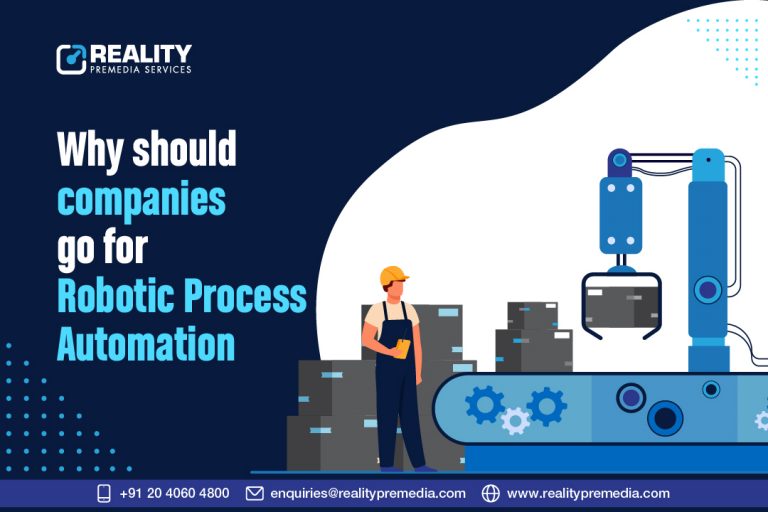|
Back to Blog
Why Companies Need Robotic Process Automation Now!
There’s no doubt that almost anything today can be done by a computer. If that’s the case, why do we humans find ourselves working more than ever; blurring the lines between work life and personal life; and most importantly facing the probability of burning out, on a daily basis? Makes you think, doesn’t it? At Reality Premedia, we’re in the business of working with machines, not like machines. And one way to do that is for companies to adopt Robotic Process Automation (RPA) now! Let’s take a closer look. What is Robotic Process Automation (RPA)? Believe it or not, most people are actually already familiar with RPA, without even knowing it. Remember the last time you called your mobile operator or your bank and were greeted with an Interactive Voice Response System (IVRS); that was an example of RPA in action. Or even when your doctor sends you text messages reminding you to visit. These are just the tip of the iceberg. RPA is a system by which humans can instruct machines to execute repetitive time-consuming manual tasks. The term ‘robotic’ in RPA, refers to software robots. These robots aka bots are designed to imitate the way humans interact with computers performing our tasks with more speed and efficiency. Combined with some aspects of artificial intelligence and machine learning techniques, the scope to use RPA in business is massive. This along with greater levels of sophistication has made RPA popular across every sector of work. Why Does My Business Need RPA in 2021? The most drastic change that came about from the pandemic was the need for organizations to move their business and backend processes online; most managed to do so quite well. Fortunately or unfortunately, this digital revolution is here to stay. That means that companies need to find a permanent solution, quickly. RPA is Easy to Implement: RPA systems are designed to make work easier for everyone, including developers. These programs use comparatively less coding, so they can be implemented sooner and non-technical staff can adapt to them easily. They also do not require any changes to the existing IT setup because they work as an add-on to current applications. The other aspect that makes them easy to implement is the fact that they can be implemented in phases. This allows companies to begin by automating just a few simple tasks before they take on more crucial processes. As the world faced communal grief, anxiety, and depression, workers across the globe experienced a shift in perspective. Along with one’s physical health, mental health took precedence over all else. RPA Boosts Employee Morale: Any job no matter how exciting comes with its share of the mundane. RPA systems were created to eliminate this. By automating high-volume repetitive tasks, it allows employees to focus on the more important, strategic aspects of the job. The recent increase in the popularity of online courses shows that employees are eager to up-skill themselves. By implementing RPA, they will have more time to do this without affecting their productivity. This doesn’t just boost morale and improve mental health; it increases the bottom-line of organizations as well. Speaking of the bottom line, the pandemic drastically affected everybody’s bottom line, irrespective of sector. Now, companies are not only struggling to survive, they need to make up for the losses they faced. RPA Increases Customer Satisfaction & Revenue: You might be wondering how automating simple internal tasks, can increase customer satisfaction. RPA does this in two ways. As mentioned above, creating time for employees to focus on high-value tasks helps them finish more work in less time, giving them the time to attend to customers better. Additionally, RPA eliminates human error altogether, as long as it is programmed correctly. When a bot does a repetitive task, it doesn’t face monotony, needs a break, or makes silly mistakes that could cost the company a lot of money. The end result is an optimized, highly efficient workflow process. The pandemic brought with it pandemonium. Lockdown rules & regulations were and are constantly being changed; rules regarding businesses, whether essential or not are also in a state of flux. And to make matters worse every person who interacts with a business today has embraced technology and expects the same from a business. RPA Improves Accuracy & Compliance: All these changes have increased the risk of both human error and fraud. RPA helps businesses log each step of their work, ensure they follow the latest compliance rules and helps them find & fix errors quickly. From the depths of data, RPA also helps companies extract & manage the most relevant high-quality information, making accuracy a part of day-to-day operations. As we experienced heart-warming stories of people going out of their way to help complete strangers, perhaps the most important lesson the world learned the hard way, was how to work together. RPA Helps Organizations Work Cohesively: With the right programming, RPA bots can easily correct errors amongst multiple departments within an organization. Take, for example, filling up a form. If your form is missing some data or something is filled incorrectly, the form is returned to you. With RPA however, if the data exists somewhere within your organization, the bot can fill it up automatically, essentially omitting the need for one form, to be checked by multiple departments. RPA has the potential to transform the post-pandemic world of work, permanently. As you can see these bots are designed to enhance our productivity. After all, work only works when you’re happy at it. Contact us to begin your journey with RPA.
0 Comments
Read More
Your comment will be posted after it is approved.
Leave a Reply. |
Drop us a line
|

 RSS Feed
RSS Feed


